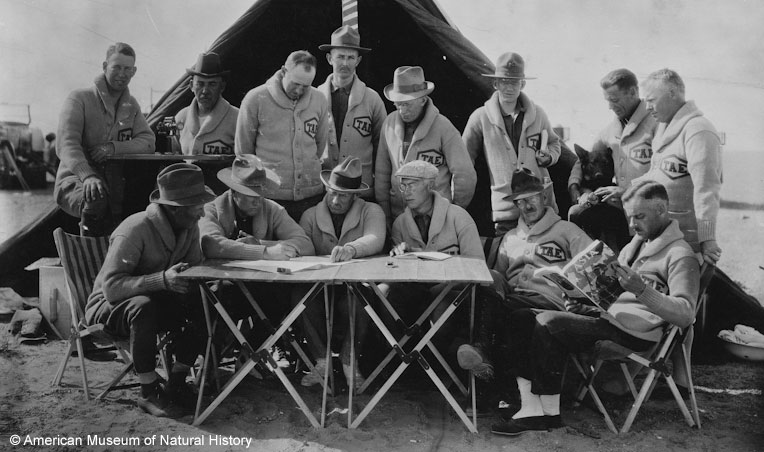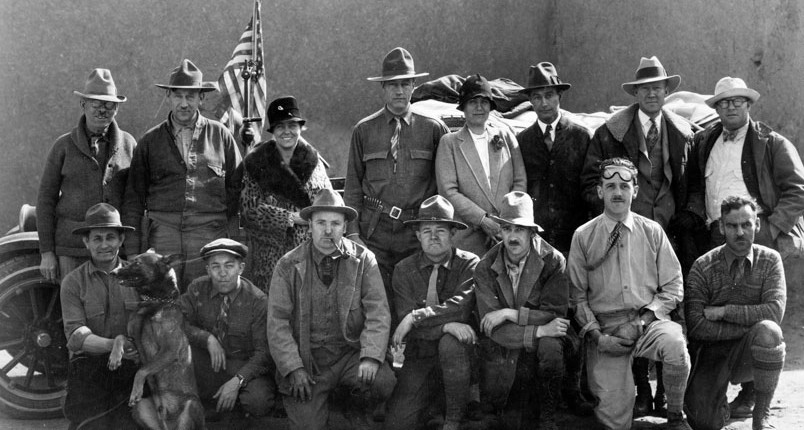About the Roy Chapman Andrews Society
The Roy Chapman Andrews Society was formed in 1999 by a group of Beloit, Wisconsin residents intent on building more awareness of one of the 20th Century’s most famous explorers. Since Roy Chapman Andrews was born and raised in Beloit, it was only fitting that such a society exist in his hometown.
The idea was first discussed by former City Manager and Attorney, Daniel T (Tom) Kelley, who had always looked for ways to promote Beloit and the treasures of this small mid-western town. After finding a group of interested persons from varied backgrounds, monthly meetings began to take place to decide how to go about bringing Andrews back into prominence. They decided to incorporate and form a society.
Unfortunately, Kelly was unable to see his work come to fruition with his passing of cancer on January 19, 2001. However, his dream continued on, and the Society has gone on to become a prominent group in Beloit. Founding Board Members included (in no particular order), Tom Kelley, Kerry Branham, Paul Rasmussen, Greg Quigley, Ann Bausum, Bette Lang, Lynnette Newton, Christine Schlichting, and Karrie Porter-Brace.
Mission:
To inspire scientific discovery by engaging with contemporary explorers who exemplify the legacy of Roy Chapman Andrews, Beloit’s native son.

2023 Board of Directors
Shannon Fie (President)
Larry Arft (Vice President)
Steve Vavrus (Immediate Past President)
Connie Sveum (Treasurer)
Kelly Cluer
Scott Fisher
Greg Gerard
Frank McKearn
Linda Perrigo
Britt Scharringhausen
Robert Atwater
The Roy Chapman Andrews Society does not have a physical location; however, written inquiries regarding the Society can be directed to:
Roy Chapman Andrews Society, Ltd.
P.O. Box 273
Beloit, WI 53512-0273 USA
E-mail inquiries: info@roychapmanandrewssociety.org
Contact Us
We would love to hear from you! Please fill out this form and we will get in touch with you shortly.
About the Roy Chapman Andrews Society
The Roy Chapman Andrews Society was formed in 1999 by a group of Beloit, Wisconsin residents intent on building more awareness of one of the 20th Century’s most famous explorers. Since Roy Chapman Andrews was born and raised in Beloit, it was only fitting that such a society exist in his hometown.
The idea was first discussed by former City Manager and Attorney, Daniel T (Tom) Kelley, who had always looked for ways to promote Beloit and the treasures of this small mid-western town. After finding a group of interested persons from varied backgrounds, monthly meetings began to take place to decide how to go about bringing Andrews back into prominence. They decided to incorporate and form a society.
Unfortunately, Kelly was unable to see his work come to fruition with his passing of cancer on January 19, 2001. However, his dream continued on, and the Society has gone on to become a prominent group in Beloit. Founding Board Members included (in no particular order), Tom Kelley, Kerry Branham, Paul Rasmussen, Greg Quigley, Ann Bausum, Bette Lang, Lynnette Newton, Christine Schlichting, and Karrie Porter-Brace.
Mission:
To inspire scientific discovery by engaging with contemporary explorers who exemplify the legacy of Roy Chapman Andrews, Beloit’s native son.
2023 Board of Directors
Steve Vavrus (President)
Joe Stadelman (Immediate Past President)
Vicki Dencker (Treasurer)
Larry Arft
Kelly Cluer
Nick Dimassis
Shannon Fie
Scott Fisher
Greg Gerard
Bill Henderson
Tom Holmes
Frank McKearn
Linda Perrigo
Britt Scharringhausen
Robert Atwater
Description:
The Roy Chapman Andrews Society Distinguished Explorer Award is presented to an explorer/scientist in honor of one of the 20th century’s most acclaimed explorers, Roy Chapman Andrews (1884-1960).
The award recognizes outstanding achievements in scientific discovery through explorations that offer new insights into previously unknown or poorly known subjects or areas.
Awards will be based on both the scientific significance of the exploration and the use of innovative approaches during field work in terms of methods, scope, or subjects of study. The award includes a commemorative statue and a cash prize.
Criteria:
Criteria for consideration of award candidates include:
- The recipient must have designed, directed, and conducted scientific explorations in the field resulting in discoveries of worldwide significance.
- The recipient must have shared these discoveries widely in academic and popular forums.
- The recipient’s work must be innovative and employ an interdisciplinary, team-oriented approach.
- No awards will be made in absentia or posthumously.
Presentation:
The award is presented at a public ceremony sponsored by the Society, and hosted by Andrews’ alma mater, Beloit College, in his hometown of Beloit, Wisconsin. Awards will be made on or near January 26th, the anniversary of Andrews’ birth. Each year’s recipient will present an address, appropriate for an audience of the general public, about his or her work and experiences. Travel expenses and accomodations will be provided.
Selection procedure:
Candidates for the Distinguished Explorer Award will be nominated by a selection committee chosen by the Society’s Board. The committee will consist of members of the Society and may include selected past recipients of the award and other distinguished scientists. The committee will develop a list and file of potential nominees who meet the selection criteria and will solicit additional names from Society members, past recipients, and others.
As early as possible during the year preceding each DEA presentation, the committee will review and discuss potential nominees. By mid-June, the committee will recommend from one to three candidates for consideration by the Society’s Board.
Using this list, the Board will select and approve the recipient by no later than its July meeting. The award recipient will be announced to Society members first and then to the general public as soon as the program date(s) have been determined.

